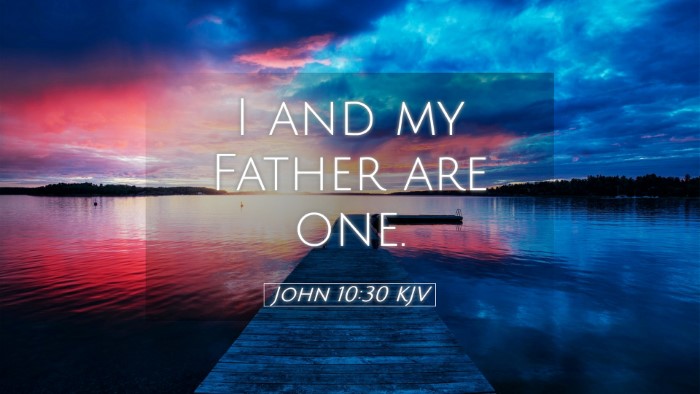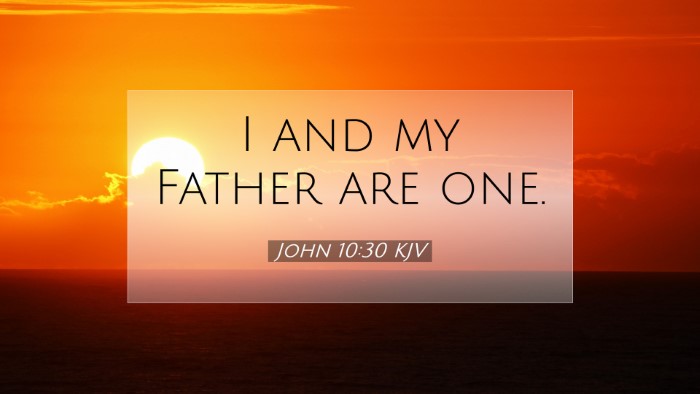Commentary on John 10:30
Verse: "I and my Father are one." - John 10:30
Introduction
The declaration of Jesus in John 10:30 is profound and pivotal, encapsulating His divine identity and the unity between Him and the Father. This passage invites deep theological reflection, as it speaks to the relationship within the Godhead and the nature of Christ's mission on earth. The insights from Matthew Henry, Albert Barnes, and Adam Clarke shed light on various dimensions of this verse, enhancing its understanding for pastors, students, theologians, and scholars.
The Deity of Christ
Matthew Henry's Insight: Henry emphasizes that this statement is a claim of deity. He notes that Jesus identifies His essence with that of the Father, reinforcing the belief in the Trinity. According to Henry, to be “one” implies not just unity of purpose but also unity of being, suggesting that Christ is fully God as the Father is fully God.
Albert Barnes' Perspective: Barnes elaborates on this relationship by asserting that Christ’s words underscore His equality with the Father. He argues that this unity means that the works of Christ are the works of God. Thus, the miracles and teachings of Jesus are not separate from God's will but flow from His divine essence.
Adam Clarke's Commentary: Clarke delves into the implications of the phrase “I and my Father.” He stresses the intimate relationship between Jesus and the Father, interpreting “one” as an affirmation of collaboration in the divine purpose of salvation. Clarke argues that this unity invites believers into a relationship with God, emphasizing both the personal and communal aspects of faith.
The Context of the Declaration
The context surrounding John 10:30 is crucial for understanding its fullness. Jesus makes this assertion in response to challenges from the Jewish leaders regarding His authority and identity. The following insights provide a deeper appreciation of this context:
- Matthew Henry: Highlights that this declaration made in the face of opposition serves as a testament to Christ's confidence in His mission. Despite threats of stoning, Jesus remains unwavering in His affirmation of divine truth.
- Albert Barnes: Points out that this statement came after Jesus had made claims about Himself being the Good Shepherd. He connects the metaphor of shepherding to the divine relationship in which Jesus sacrifices for His sheep.
- Adam Clarke: Remarks on the hostility Jesus faced from the religious leaders and interprets His statement as a bold declaration of divine sonship, which directly confronts the prevailing unbelief of the time.
Theological Implications
John 10:30 carries significant theological implications regarding Christology and the nature of God. Let us explore some of these implications:
- Understanding the Trinity: The affirmation of Jesus’ unity with the Father lays a foundation for the Christian understanding of the Trinity—a complex, yet essential doctrine for Christianity.
- Christ as Mediator: In stating His oneness with the Father, Jesus embodies the mediator role described in scripture. His authority and direct access to God enable believers to approach God confidently.
- Security of Believers: This unity assures believers of their security in Christ. Just as the Father and the Son work in perfect accord, so too does Christ work for the protection and preservation of His followers.
Practical Application
The implications of John 10:30 invite practical applications into the lives of believers:
- Affirmation of Faith: Pastors and leaders can encourage congregations to affirm their belief in the divine nature of Christ and His authority, rooted in this scripture.
- Encouragement in Trials: Understanding that Jesus stands unified with the Father provides strength during trials, as believers can rest in the assurance of divine support.
- Fostering Unity: Just as Jesus and the Father are one, believers are called to cultivate unity within the body of Christ, reflecting the nature of God in their relationships.
Conclusion
In conclusion, John 10:30 represents a cornerstone of Christian doctrine, illustrating the profound union between Jesus and the Father. Through the insights of Matthew Henry, Albert Barnes, and Adam Clarke, we can appreciate the depth of this statement, embracing its implications for doctrine, worship, and Christian living. As followers of Christ, recognizing that "I and my Father are one" should lead us to a deeper understanding of God’s nature and a more profound commitment to our faith.


